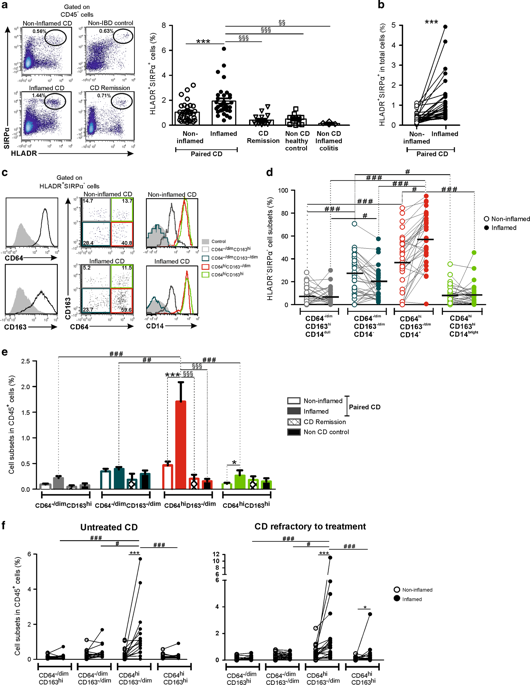Mucosal Immunology ( IF 7.9 ) Pub Date : 2019-01-22 , DOI: 10.1038/s41385-018-0126-0 Laurence Chapuy 1 , Marwa Bsat 1 , Siranush Sarkizova 2, 3 , Manuel Rubio 1 , Amélie Therrien 1, 4 , Evelyne Wassef 1 , Mickael Bouin 4 , Katarzina Orlicka 4 , Audrey Weber 4 , Nir Hacohen 3 , Alexandra-Chloé Villani 3, 5 , Marika Sarfati 1

|
Inflammatory bowel diseases are associated with dysregulated immune responses in the intestinal tissue. Four molecularly identified macrophage subsets control immune homeostasis in healthy gut. However, the specific roles and transcriptomic profiles of the phenotypically heterogeneous CD14+ macrophage-like population in inflamed gut remain to be investigated in Crohn’s disease (CD). Here we identified two phenotypically, morphologically and functionally distinct colonic HLADR+SIRPα+CD14+ subpopulations that were further characterized using single-cell RNA-sequencing (scRNAseq) in CD. Frequencies of CD64hiCD163−/dim cells selectively augmented in inflamed colon and correlated with endoscopic score of disease severity. IL-1β and IL-23-producing CD64hiCD163−/dim cells predominated over TNF-α-producing CD64hiCD163hi cells in lesions. Purified “inflammatory monocyte-like” CD163−, but not “macrophage-like” CD163hi cells, through IL-1β, promoted Th17/Th1 but not Th1 responses in tissue memory CD4+T cells. Unsupervised scRNAseq analysis that captures the entire HLADR+SIRPα+ population revealed six clusters, two of which were enriched in either CD163− or CD163hi cells, and best defined by TREM1/FCAR/FCN1/IL1RN or CD209/MERTK/MRCI/CD163L1 genes, respectively. Selected newly identified discriminating markers were used beyond CD163 to isolate cells that shared pro-Th17/Th1 function with CD163− cells. In conclusion, a molecularly distinct pro-inflammatory CD14+ subpopulation accumulates in inflamed colon, drives intestinal inflammatory T-cell responses, and thus, might contribute to CD disease severity.
中文翻译:

克罗恩病中以单细胞 RNA 分析为特征的两个不同的结肠 CD14+ 亚群。
炎症性肠病与肠道组织中免疫反应失调有关。四种分子鉴定的巨噬细胞亚群控制着健康肠道的免疫稳态。然而,在克罗恩病 (CD) 中,炎症肠道中表型异质性 CD14 +巨噬细胞样群体的具体作用和转录组学特征仍有待研究。在这里,我们确定了两个表型、形态和功能不同的结肠HLADR + SIRPα + CD14 +亚群,使用 CD 中的单细胞 RNA 测序 (scRNAseq) 进一步表征。CD64 hi CD163 −/dim的频率细胞在发炎的结肠中选择性增加,并与疾病严重程度的内窥镜评分相关。病变中产生IL-1β 和 IL-23 的 CD64 hi CD163 -/dim细胞优于产生 TNF-α 的 CD64 hi CD163 hi细胞。纯化的“炎性单核细胞样”CD163 -而不是“巨噬细胞样”CD163 hi细胞,通过 IL-1β,促进组织记忆 CD4 + T 细胞中的 Th17/Th1 而不是 Th1 反应。捕获整个 HLADR + SIRPα +群体的无监督 scRNAseq 分析揭示了六个簇,其中两个富含 CD163 -或 CD163 hi细胞,最好分别由TREM1/FCAR/FCN1/IL1RN或CD209/MERTK/MRCI/CD163L1基因定义。选定的新鉴定的鉴别标记用于 CD163 以外的细胞,以分离与 CD163 -细胞共享 pro-Th17/Th1 功能的细胞。总之,分子上不同的促炎性 CD14 +亚群在发炎的结肠中积聚,驱动肠道炎症性 T 细胞反应,因此可能导致 CD 疾病的严重程度。











































 京公网安备 11010802027423号
京公网安备 11010802027423号